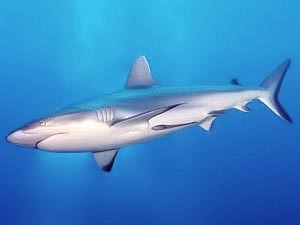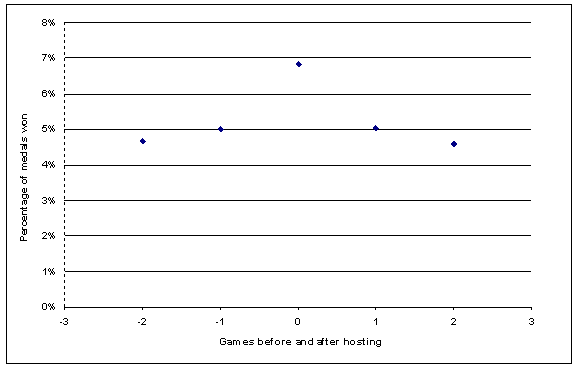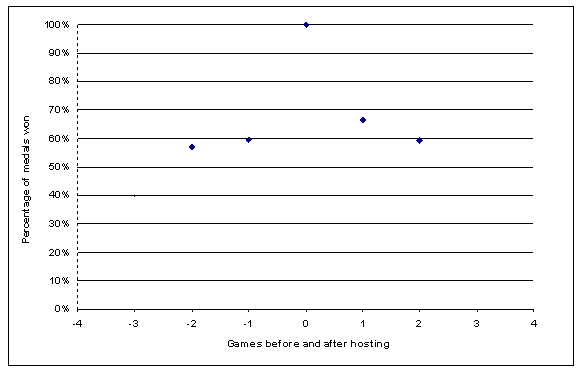This award is dedicated to work proclaiming a cause-and-effect relationship when one probably doesn't exist. Often it's not the fault of the scientists involved - scientists are wont to musing upon possible reasons for their results. No, it's generally the media playing up the story for effect.
A quick reminder of our 3 reasons correlations can occur:
- There is a direct cause and effect relationship between the two data sets;
- There is an underlying reason for the two data sets to move together, as opposed to one causing the other;
- There is no cause and effect and no underlying reason for the correlation - it's simply a coincidence or the work of a devious statistician.
Shark Attacks Drop Due to Global Financial Crisis
 Reuters recently reported that the number of fatal shark attacks in 2008 dropped from the 2007 result of 71 to 59, and placed the blame (if that's the right term) at the feet of the GFC.
Reuters recently reported that the number of fatal shark attacks in 2008 dropped from the 2007 result of 71 to 59, and placed the blame (if that's the right term) at the feet of the GFC.George Burgess, who directs the International Shark Attack File at the University of Florida, said:
"I can't help but think that contributing to that reduction may have been the reticence of some people to take holidays and go to the beach for economic reasons."
This is rather tenuous speculation. There are quite a number of issues involved here:
- Is the data accurate? Have they captured every fatal shark-attack across the whole world over the last year?
- Is the decrease simply noise? What about other years? Two data points don't tell us much.
- What other factors are involved? Fishing, oceanography, where the attacks occurred, availability of medical resources, the list goes on. Surely more than economics.
"Year-to-year variability in local economic, social, meteorological and oceanographic conditions also significantly influences the local abundance of sharks and humans in the water and, therefore, the odds of encountering one another. As a result, short-term trends in the number of shark attacks - up or down - must be viewed with caution."
The ISAF prefers to look at the data on a larger time-frame, and when doing that, the data suggests that shark attacks are going up because humans are spending more time in the ocean (a fair conclusion to draw), despite the fact shark numbers are getting smaller.
"Even with the recent levelling trend, the number of unprovoked shark attacks has grown at a steady pace over the past century. Overall, the 1990's had the highest attack total of any decade and the first decade of the 21st century will exceed that total."
The ISAF also notes that it's data could have errors in it, suggesting that the difference between 2007 and 2008 could be noise or data inaccuracy:
"The ISAF's efficiency in discovering and investigating attacks has increased greatly over the past decade, leading to further increases in attack number. Transfer of the ISAF to the Florida Museum of Natural History in 1988 resulted in greatly expanded international coverage of attack incidents and a consequent jump in the number of documented attacks.... Fundamental advances in electronic communication, a greatly expanded network of global ISAF scientific observers, and a rise in interest in sharks throughout the world, spawned in part by increased media attention given to sharks, have promoted more complete documentation of attack incidents in recent years.... Our strong web presence regularly results in the receipt of unsolicited documentation of shark attacks. Many of these attacks likely would have been missed in the past."
 So congratulations to the first recipients of Correlation of the Week! The award is brought to you by the Church of The Flying Spaghetti Monster, which blames global warming on the fact that pirate numbers are reducing (and therefore offending TFSM).
So congratulations to the first recipients of Correlation of the Week! The award is brought to you by the Church of The Flying Spaghetti Monster, which blames global warming on the fact that pirate numbers are reducing (and therefore offending TFSM).So I say to you Reuters and those correlating shark attacks with the economy:
"What would the Flying Spaghetti Monster Do?"






















